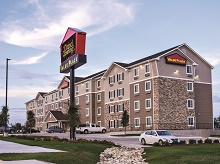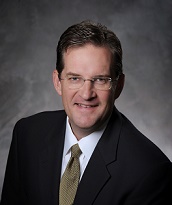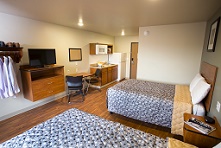 WICHITA, KAN.—This week Value Place announced the opening of a newly constructed hotel in Columbus, Ohio. The company, with nearly 190 hotels in 32 states, has been on a roll lately. Almost every month this year the company has either opened a property or announced the construction of one. Value Place, a leader in the extended-stay segment, is known for offering an affordable, clean, safe and simple place to stay. What it is not known for is the steps it has taken to be as environmentally efficient as possible—a result of the company’s fanatical attention to keeping costs down.
WICHITA, KAN.—This week Value Place announced the opening of a newly constructed hotel in Columbus, Ohio. The company, with nearly 190 hotels in 32 states, has been on a roll lately. Almost every month this year the company has either opened a property or announced the construction of one. Value Place, a leader in the extended-stay segment, is known for offering an affordable, clean, safe and simple place to stay. What it is not known for is the steps it has taken to be as environmentally efficient as possible—a result of the company’s fanatical attention to keeping costs down.
“From our perspective, a lot of the hotel business is top line focused and we try to be bottom line focused,” says Kyle Rogg, President and COO of Value Place. “We are continually trying to find ways to spend less without compromising the guest experience.”
Since the opening of its first property in Wichita, Kan. in 2003, Value Place has focused on delivering the potential for the greatest net operating income. “We don’t staff 24 hours a day,” Rogg said. “We don’t pay someone to sit and play solitaire at night. We don’t clean rooms daily. Every two weeks sheets and towels are washed. It saves a lot of water and energy. We have a smaller laundry footprint.”
Reasonable Payback on LED Lighting
 Several years ago, the company stepped up its focus on energy, water and building efficiency. Almost all of the company’s properties have been converted to LED lighting. Rogg said his team went through a lot of bulbs and suppliers to find the bulbs they liked. “The numbers are very compelling,” Rogg said. “We are seeing a payback in the 2.5-year time frame. The guests report the quality of the light is better. We are improving lighting in exterior areas as well.” The LEDs that have been installed have a labor-saving 50,000 hour life. There are 600 ceiling lights in the average Value Place property.
Several years ago, the company stepped up its focus on energy, water and building efficiency. Almost all of the company’s properties have been converted to LED lighting. Rogg said his team went through a lot of bulbs and suppliers to find the bulbs they liked. “The numbers are very compelling,” Rogg said. “We are seeing a payback in the 2.5-year time frame. The guests report the quality of the light is better. We are improving lighting in exterior areas as well.” The LEDs that have been installed have a labor-saving 50,000 hour life. There are 600 ceiling lights in the average Value Place property.
Further saving energy, guestroom energy management systems power down HVAC systems and lighting when a guest leaves the room. Also, Value Place has transitioned to a 2 X 6 from a 2 X 4 on exterior walls. Rogg says added insulation has resulted in a slightly higher build cost but a 2.8 percent reduction in energy needed to heat a property. “It has also resulted in better soundproofing,” he says. Using the EPA’s Energy Star Portfolio Manager, Value Place found that its properties are more efficient than 95 percent of the hotels benchmarked on a square foot basis.
Low-flow faucets help save about 1,000 gallons of water a day in Value Place’s average 124-room hotel. Low-flow showerheads also help conserve water. High-quality tank valves keep toilets from running unnecessarily. These steps, along with running laundry equipment less often than comparable hotels, allows Value Place to save on tap fees during construction.
Goodbye to Carpet
 Having found from guest reviews and ratings that worn-out carpet dates a property more than just about anything else, Value Place is transitioning to wood-plank vinyl flooring because of its efficiency, durability and maintenance ease. Forty properties have made the switch and all new-builds are getting it. The flooring has an acoustical underlayment. Individual planks can be replaced. Vacuums and shampoo machines are no longer needed.
Having found from guest reviews and ratings that worn-out carpet dates a property more than just about anything else, Value Place is transitioning to wood-plank vinyl flooring because of its efficiency, durability and maintenance ease. Forty properties have made the switch and all new-builds are getting it. The flooring has an acoustical underlayment. Individual planks can be replaced. Vacuums and shampoo machines are no longer needed.
“You can only clean a carpet so much,” Rogg said. “I have operations folks who take black lights with them. With carpet you are more likely to have challenges or other unsavory situations. And, because we have kitchens, wood-plank vinyl flooring makes a lot of sense. It saves staff time. Guests say it feels cleaner. They like that feel of the room being cleaner.”
Rogg says Value Place is always testing new products with the potential to reduce costs even more. “We are testing some bedding that would clean with fewer chemicals and less water,” he says.
Rogg adds that Value Place has looked at solar as a possible option for generating energy but did not find the economics to be compelling. Value Place has also looked at LEED but not hard, preferring instead to focus on construction savings.
Go to Value Place.
Glenn Hasek can be reached at editor@greenlodgingnews.com.





